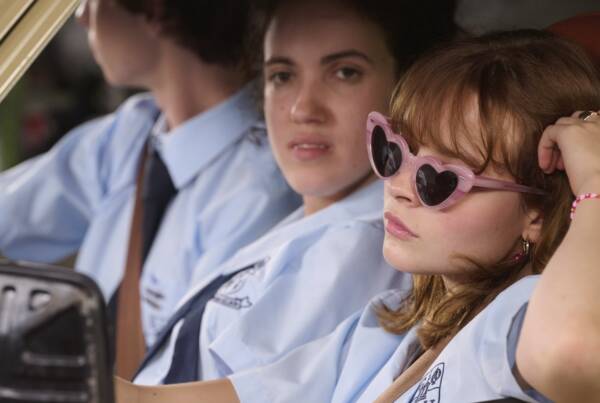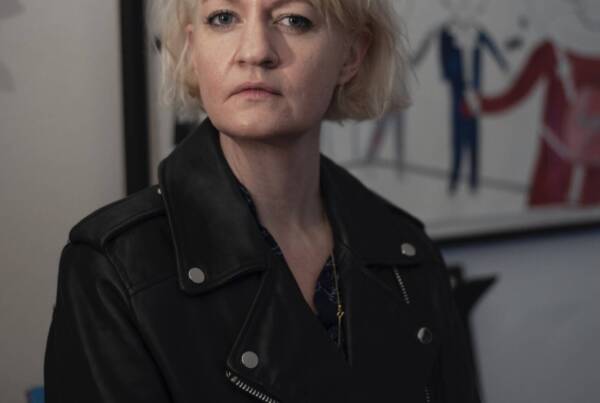Writing and artwork by Seth Lukas Hynes // I enjoyed and recommend all of these creative works, but these recommendations come with heavy, uncomfortable caveats due to certain morally offensive elements.
Writing and artwork by Seth Lukas Hynes
I’ve recently found myself considering what to do when media I love has problematic elements.
French filmmaker Jean-Pierre Jeunet is one of my favourite directors, and I especially love his early work with long-time creative partner Marc Caro, namely the dark, surreal post-apocalyptic comedies Delicatessen and The City of Lost Children. The 2009 film Micmacs is arguably a return to form for Jeunet, after more grounded fare such as Amelie and A Very Long Engagement, and follows Bazil (Danny Boon), a homeless street performer, who find support and shelter with a band of theatrical misfits and plots revenge against the arms companies that wronged him and his family.
Micmacs is a delightful film full of quirky characters and grungy yet lush visuals, and the narrative has an appealing ‘seat-of-the-pants’ quality to it, as the heroes execute elaborate, ludicrous plans and face ever more outlandish obstacles while still seeming very much in control.
However, a seemingly innocuous moment in the conclusion nearly soured the whole movie for me.
A major subplot in Micmacs involves Bazil’s adversarial friendship with Elastic Girl (Julie Ferrier), a plucky contortionist, which steadily blossoms into love. The pair employ a unique hand-clicking sign language together, and in the film’s happy-ending montage, Bazil and Elastic Girl have a tactile conversation before Bazil grabs the top of her knitted body-suit and pulls her upward for a kiss.
I was honestly taken aback by this scene, which is visually reminiscent of pulling someone’s hair. Bazil has effectively restrained Elastic Girl, and while she eagerly accepts the kiss, her eyes still display momentary surprise and discomfort. It’s a domineering and even violent action on Bazil’s part.
Micmacs is a wonderful film overall, but Bazil physically restraining Elastic Girl for a kiss, in the final seconds before the credits, left a bad taste in my mouth.
The film also has a homophobic joke at around the middle-point. Bazil suggests that the team should ‘focus our gaze’ in their new plan, and through the confusion of Bazil’s friends, the screenwriter makes a pun between ‘gaze’ and ‘gays’. That would have been mildly funny in itself, but Bazil clarifies the word ‘gaze’ with a vocalisation that equates homosexuality with effeminacy.
What Happened to Monday is a stylish 2017 science fiction thriller featuring Swedish actress Noomi Rapace in a seven-fold starring role.
In a dystopian future affected by extreme overpopulation, having more than one child is a criminal offence, and Rapace plays identical septuplets who are each named after days of the week and raised in secret by their grandfather (Willem Dafoe). When Monday goes missing, the sisters must pool their personalities and skills to find her, and in the process uncover a vile conspiracy within the Child Allocation Bureau (CAB), the organisation that enforces the region’s strict one-child policy.
Rapace delivers one of the most striking performances of her career, masterfully conveying so many distinct personas. The pacing is quick and steady, the action scenes are visceral, the sombre flashbacks are very effective at building the world and foreshadowing the main conflict, and the plot has some well-executed twists.
But the film has an important scene that makes me reluctant to recommend it.
The seven sisters all assume the identity of Karen Settman as ‘camouflage’, and each carry out life as Karen in the outside world on the day corresponding to their name.
In order for Friday to hack into CAB’s network and find Monday, Saturday must get close to Adrian (Marwan Kenzari), a CAB security guard sympathetic to ‘sibling rights’ and with whom Monday has a relationship. Saturday and Adrian end up having sex, and while the scene is shot tenderly and carries a strong aura of apprehensive yet excited self-discovery on Saturday’s part, the sex scene has some disturbing implications.
From Adrian’s perspective, he is having sex with Karen, the same woman he’s known intimately for weeks. But while Saturday is still ‘playing’ Karen, she is objectively a different person from Monday, the version of Karen who Adrian knows. Since the sex is taking place under false pretences due to Saturday’s undisclosed identity, however risky the disclosure would be, Saturday is basically committing rape by deception.
Moving onto a less severe example of problematic elements in media I enjoy, The Missy Chronicles, an anthology of Doctor Who short stories, was released on February 28, 2018.
The anthology stars Missy (played in the show to diabolical perfection by Michelle Gomez), the latest – and first female – incarnation of the Master, the Doctor’s arch-nemesis. The stories are of uneven quality, but are all fun, suspenseful and showcase Missy’s deadly genius and haughty, gleeful evil beautifully. Some of the stories contain clever nods to past versions of the Master, and Missy frequently subverts traditional feminine gender roles and situations, such as marriage, childcare and being excluded from high-class ‘boys club’ establishments, in delightfully dark ways.
The best story is Girl Power, written by Jacqueline Rayner. Presented as a series of text messages and forum chats involving Missy, the Doctor and the latter’s ‘secretary’ Nardole, the story shows Missy communicating with famous women from history and attempting to incite a bloody feminist revolution throughout time.
It’s fist-pumping, incredibly witty stuff, but at one point, Missy expresses a rather reductive view on what constitutes womanhood.
Missy professes the bond she feels, as a woman, with her female readers, but begins the mission statement with ‘Dear XX chromosome humans’. While Missy does observe that ‘being a woman isn’t just about the addition of some wobbly bits and a sudden inability to grow a goatee’, she is more referring to the societal oppression that women share. She later airs her distaste for the idea of pregnancy, explicitly framing women as physical bearers of children. The historical women who gather for Missy’s huge social media chat about crushing the patriarchy, including Boudicca, Agatha Christie, Marie Antoinette, Grace O’Malley and Anne Boleyn, are generally perceived as cis-women, and Missy’s remarks throughout the story only encompass cis-women.
One Goodreads reviewer (whose post I can no longer find) expressed her confusion on how Marsha P. Johnson and Sylvia Rivera, trans-women of colour instrumental to the Stonewall Riots, weren’t included in Missy’s campaign.
Gender is malleable, and you don’t necessarily need double-X chromosomes, breasts and a uterus to be a woman. Missy should be acutely aware of this, since her past incarnations were male.
Missy (and Rayner) ignoring trans-women, and using a limited biological view on womanhood, is quite disappointing in a story about female empowerment.
I enjoyed and recommend all of these creative works, but these recommendations come with heavy, uncomfortable caveats due to certain morally offensive elements.
Is it appropriate to continue liking these works, given their flaws?







